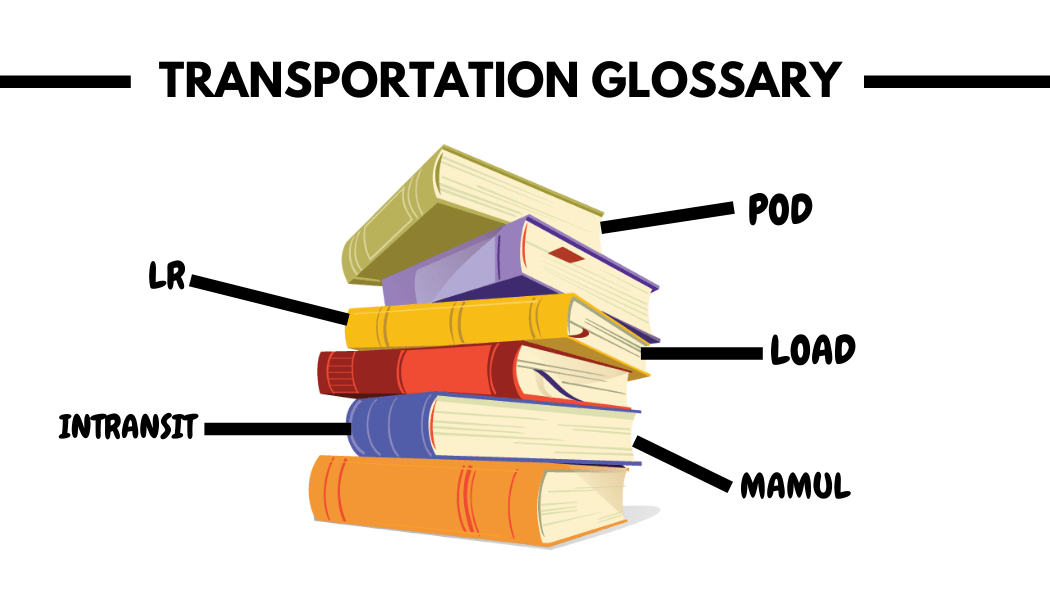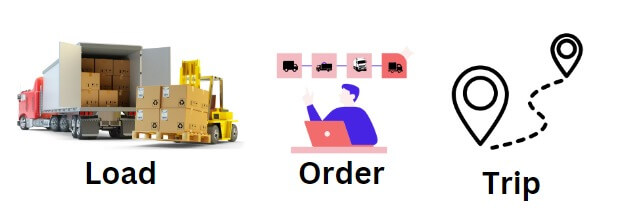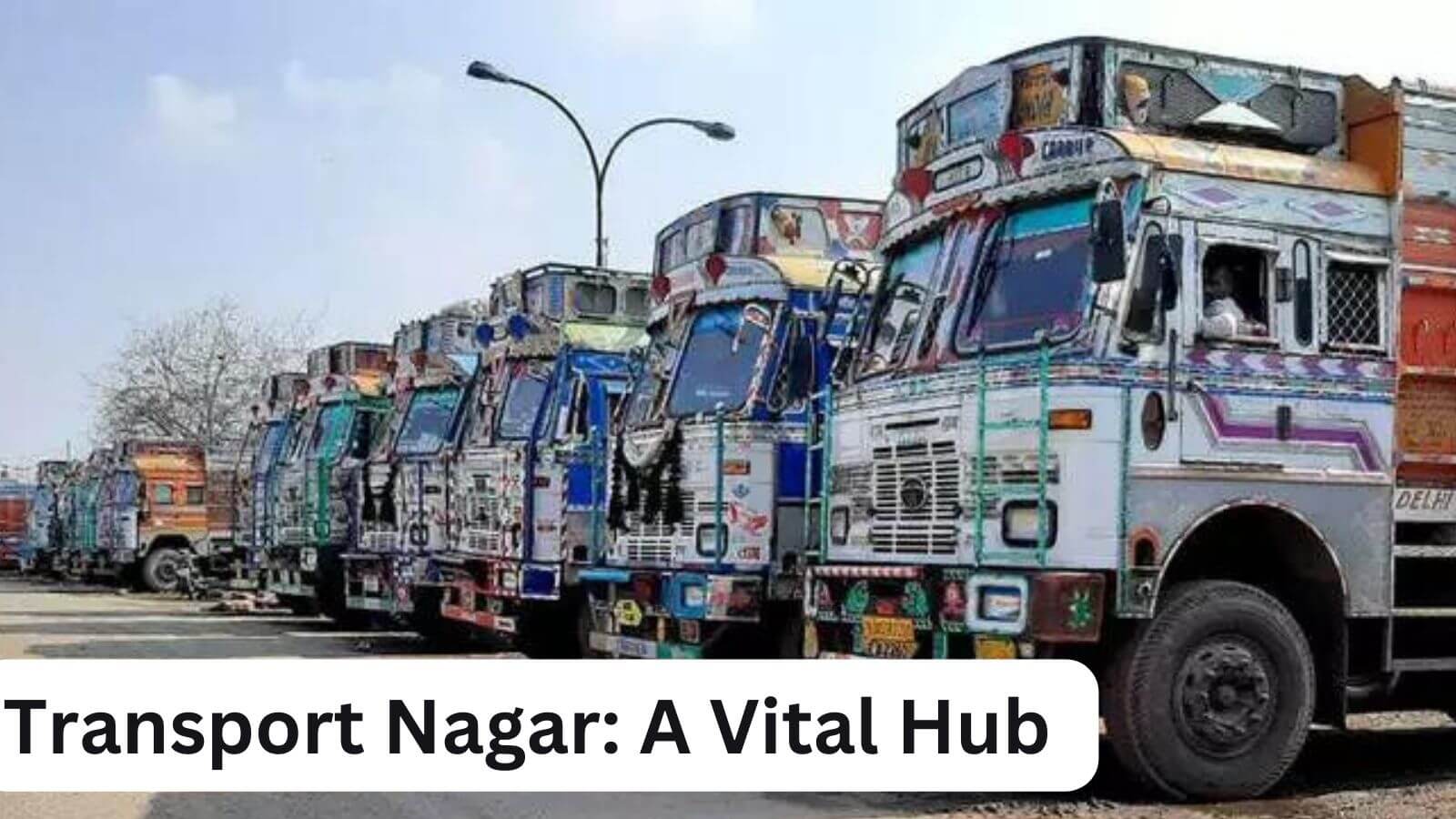
Transportation refers to the movement of people, goods, or animals from one place to another. It can involve various modes of transportation, including cars, buses, trains, planes, boats, and bikes. Transportation is important for economic growth, social mobility, and access to goods and services. Efficient transportation systems also play a significant role in reducing traffic crowding, air pollution, and carbon emissions, and improving public health and safety.
Glossary refers to an alphabetical list of words relating to a specific subject, text, or dialect, with explanations and can also be called as a brief dictionary.
This blog lists out a series of words that is related to transportation and is helpful for getting a brief insight into it.
The Terminologies are as follows:
Table of Contents
LOAD
The term “load” refers to the quantity of goods or materials being transported in a single trip by a vehicle, vessel, or aircraft. This is measured in terms of weight, volume, or number of items. The maximum load capacity of a vehicle is set on by its size, weight, and other factors, and it is important to ensure that the load does not exceed this capacity for safety reasons.ORDER
An “order” refers to a request made by a customer to transport goods or materials from one location to another. This request usually includes information such as the origin and destination of the shipment, the type and quantity of goods to be transported, the preferred mode of transportation, and any special instructions or requirements for the shipment.INDENT
An “indent” refers to an order placed by a customer for goods that are not available at the moment for delivery or pick-up. Instead, the goods must be sourced from a supplier or manufacturer and delivered at a later time.
Indents are usually used for products that are either out of stock or not carried in the regular inventory of the seller.
For example, if a retailer receives an order for a product that is not currently in stock, they may place an indent with the supplier to have the product manufactured or sourced and delivered at a later date. Indents may also be used for products that are custom-made or require specialized manufacturing processes.TRIP
A “trip” refers to a journey or transportation of goods from one location to another using an appropriate mode of transportation, such as a truck, ship, train, or plane.

END CUSTOMER/PARTY
An “end customer” refers to the final recipient of goods or services, who is actually the user of the product. This is the person or entity that purchases or uses the product for their own purposes, rather than reselling it or using it as part of a production process.TRANSPORTER/CUSTOMER
A “transporter” is a company or individual that is responsible for moving goods or passengers from one location to another using a certain mode of transportation, such as a trucking company, shipping line, or airline. Transporters play an important role in the transportation industry, as they are responsible for ensuring that goods and passengers are transported safely, efficiently, and on time. This includes managing logistics, coordinating transportation schedules, and ensuring that appropriate resources are available to support transportation operations, such as vehicles, vessels, and other stuff.BROKER
A “broker” is a third-party intermediator that arranges transportation services on behalf of a shipper or carrier. Brokers do not own the transportation equipment used to move goods or passengers, but instead act as a coordinator in between to facilitate transportation transactions. Brokers usually work with a network of carriers and shippers to match transportation needs with available resources, negotiating rates and other terms of service on behalf of their clients. Some brokers also provide additional services, such as tracking and monitoring shipments, managing documentation and regulatory compliance, and resolving issues that arise during transportation.TRUCK OWNER
A “truck owner” is an individual or company that owns one or more trucks and operates them to transport goods or materials from one location to another. Truck owners can act as independent owner-operators, using their own trucks to contract directly with shippers or brokers to ship goods. They may also operate as part of a larger fleet owned by a trucking company, leasing their trucks to the company in exchange for compensation/revenue.
Want to know more about Truck owners, kindly visit FR8’s truck owners page to get a brief insight into it.
FLEET OWNER
A “fleet owner” is an individual or company that owns and operates a fleet of vehicles for the purpose of transporting goods or passengers. Fleet owners may own and operate vehicles in a variety of industries, such as trucking, public transportation, or logistics. They may also specialize in a particular type of vehicle, such as trucks, buses, or vans.

LR (Lorry Receipt)
A “Lorry Receipt” (LR) is a legal document used in transportation to acknowledge the receipt of goods by a carrier or transporter. The Lorry Receipt is also used as a document of evidence, which means that it represents ownership of the goods being transported. This allows the document to be used for financing purposes and to transfer ownership of the goods to another party.POD (Proof of Delivery)
“Proof of Delivery” (POD) is a document used in transportation to provide evidence that goods have been delivered to their intended recipient and location. The POD usually includes information such as the name and address of the recipient, the date and time of delivery, and the name of the person who received the goods. It may also include a description of the goods delivered or any special instructions or notes related to the delivery.CONSIGNOR
A “Consignor” refers to the individual or organization that is responsible for sending or shipping goods to a recipient or consignee. The Consignor is the owner or producer of the goods. He/she is responsible for arranging for the transportation of the goods to their destination. This may involve selecting a carrier or transportation provider, coordinating the pickup and delivery of the goods, and ensuring that the goods are properly packaged and labeled for shipping.CONSIGNEE
A “Consignee” refers to the individual or organization that receives or takes the delivery of goods that have been shipped or transported by a carrier. The Consignee is usually the recipient of the goods and is responsible for coordinating the delivery of the goods and ensuring that they are received in good condition. This may include arranging the goods to be picked up at a specified location or delivered to a particular address.SPOT/MARKET
The term “spot market” or “spot rate” refers to the market for transportation services. This is where freight shipments are arranged on a one-time basis and not as part of a long-term contract or agreement. In the spot market, shippers and freight brokers negotiate with carriers for transportation services for a specific shipment, often based on current market rates and capacity. The spot market is used when there is a sudden or unexpected increase in demand for shipping services or when regular contract arrangements are not available.
Want to get a deep information about current market rates of trips connecting various cities, visit our dedicated page displays live truck transportation cost across India.

WORKING CAPITAL
The “working capital” refers to the funds that are available to a transportation company to finance its day-to-day operations and cover its short-term expenses. Working capital is calculated by subtracting a company’s current liabilities from its current assets. Current assets include cash, accounts receivable, and inventory, while current liabilities include accounts payable, short-term debt, and other obligations that are due within one year.ADVANCE
An “advance” typically refers to a payment made by a shipper or freight broker to a carrier in advance of the delivery of goods. An advance payment is made to carriers as a way of providing them with the financial resources they need to cover expenses associated with the transportation of the goods, such as fuel, maintenance, and other operating costs. Advances may also be made to cover expenses associated with loading and unloading the goods, as well as other expenses.RECEIVABLE DOWN PAYMENT
A “receivable down payment” refers to a payment made by a shipper or customer in advance of the delivery of goods or services. The amount of the down payment may vary depending on the nature of the shipment or services, and the terms of the agreement between the shipper or customer and the carrier or service provider. The down payment is usually deducted from the final payment owed to the carrier or service provider upon completion of the shipment.BILLING/INVOICING
In transportation, “billing” or “invoicing” refers to the process of preparing and submitting a bill or invoice for services rendered by a carrier or transportation service provider to a customer responsible for payment. Billing or invoicing includes the preparation of a detailed statement that includes information such as the nature of the services provided, the quantity or weight of goods transported, the rates charged, and any additional fees or charges incurred during the transportation process.

PAYABLE
In transportation, “payable” refers to the amount of money owed by a shipper or customer to the truck owner or transportation service provider for services rendered. When a trip (shipment) is completed, the service provider will prepare an invoice or bill that details the services provided, the quantity or weight of goods transported, and any additional fees or charges incurred during the transportation process. The shipper or customer is responsible for verifying the invoice and making payment in a timely manner.PAYMENTS
In transportation, “payments” refers to the process of transferring funds from a shipper or customer to a truck owner or transportation service provider in exchange for services rendered. Payments may be made in various different forms, including electronic transfer, check, wire transfer, or other payment methods. The amount of the payment will be determined by the rates and fees agreed upon in the contract or agreement between the shipper or customer and the truck owner or service provider.RECEIVABLE
In transportation, “receivable” refers to the amount of money owed to a truck owner or transportation service provider by a shipper or customer for services rendered. Once a (trip) shipment is completed and an invoice or bill is prepared – It becomes a receivable for the truck owner or service provider until it is paid in full by the shipper or customer.RECEIPT
Receipt refers to the payment received from the customer after completing all the procedures post completion of the trip.
Read our other relevant blog post about truck and it’s load rates related information.
AP/FINAL PAYMENT
In transportation, “AP/Final Payment” refers to the final payment made by a customer to the truck owner for services rendered. The final payment is made after the verification of POD submitted by the truck owner.AR/AMOUNT PENDING
This refers to the amount receivable from the customer after a trip is completed. AR/Payment Pending is a common term used in transportation and logistics to track and manage outstanding payments, and is a crucial aspect of financial management for truck owners and service providers.
Conclusion:
You may also learn more of such transportation terminologies and get a detailed insight if you are interested.

Tushar
I'm an HR at FR8 and a passionate blogger. Apart from my day job as HR, reading and writing books/blogs are two of my absolute favorite things to do. I like taking on new challenges and most importantly, I believe in bringing efficiency towards everything I do.
I love expressing my thoughts and visions through the medium of words in the form of blogs or articles or books. Till this date, I've successfully published three short-novels on my own and will continue to do so.






